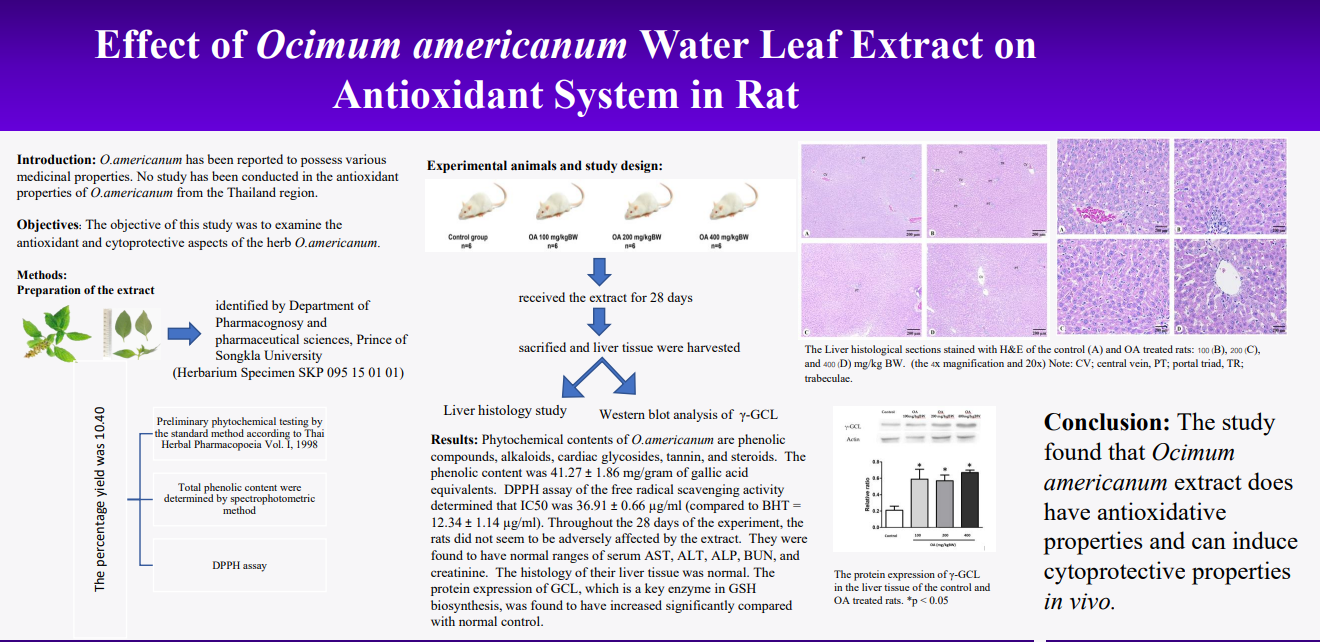Effect of Ocimum americanum Water Leaf Extract on Antioxidant System in Rat
Keywords:
Antioxidative properties, DPPH, γ-GCL, Liver histology, Ocimum americanumAbstract
Introduction: O. americanum has been reported to possess various medicinal properties. No study has been conducted in the antioxidant properties of O. americanum from the Thailand region.
Objectives: The objective of this study was to examine the antioxidant and cytoprotective aspects of the herb O. americanum.
Methods: Aqueous leaf extract of O. americanum was screened for phytochemical contents. Antioxidant properties were determined by the DPPH method. The rats were fed aqueous leaf extract for 28 days. Blood was drawn and collected to estimate the levels of BUN, Creatinine, AST, ALT, and ALP. After that, the rats were sacrificed. Their liver tissues were collected and processed for histological study. Western blot analysis was performed to determine the expression of γ-GCL.
Results: Phytochemical contents of O. americanum are phenolic compounds, alkaloids, cardiac glycosides, tannin, and steroids. The phenolic content was 41.27 ± 1.86 mg/gram of gallic acid equivalents. DPPH assay of the free radical scavenging activity determined that IC50 was 36.91 ± 0.66 µg/ml (compared to BHT = 12.34 ± 1.14 µg/ml). Throughout the 28 days of the experiment, the rats did not seem to be adversely affected by the extract considering their . They were found to have normal ranges of serum AST, ALT, ALP, BUN, and creatinine. The histology of their liver tissue was normal. The protein expression of GCL, which is a key enzyme in GSH biosynthesis, was found to have increased significantly compared with normal control.
Conclusions: The study found that Ocimum americanum extract does have antioxidative properties and can induce cytoprotective properties in vivo.
Downloads
References
Kaleem M, Asif M, Ahmed QU, Bano B. Antidiabetic and antioxidant activity of Annona squamosa extract in streptozotocin-induced diabetic rats. Singapore Med J. 2006;47(8):670-675.
Karuna R, Reddy SS, Baskar R, Saralakumari D. Antioxidant potential of aqueous extract of Phyllanthus amarus in rats. Indian J Pharmacol. 2009;41(2):64-67. doi: 10.4103/0253-7613.51342.
Pham-Huy LA, He H, Pham-Huy C. Free radicals, antioxidants in disease and health. Int J Biomed Sci. 2008;4(2):89-96. Accessed March 24, 2023. https://doi.org/10.1155/2014/254396.
Anandjiwala S, Bagul MS, Parabia M, Rajani M. Evaluation of free radical scavenging activity of an ayurvedic formulation, panchvalkala. Indian J Pharm Sci. 2008;70(1):31-35. doi: 10.4103/0250-474X.40328.
Sanchez JC, Garcia RF, Cors MT. 1,1-Diphenyl-2-picrylhydrazyl radical and superoxide anion scavenging activity of Rhizophora mangle (L.) bark. Pharmacognosy Res. 2010;2(5):279-284. doi: 10.4103/0974-8490.72323.
Kedare SB, Singh RP. Genesis and development of DPPH method of antioxidant assay. J Food Sci Technol. 2011;48(4):412-422. doi: 10.1007/s13197-011-0251-1.
Sharma OP. DPPH antioxidant assay revisited. Food Chemistry. 2009;113(4): 1202-1205. Accessed March 24. 2023.https://doi.org/10.1016/j.foodchem.2008.08.008.
Seo YJ, Lee JW, Lee EH, Lee HK, Kim HW, Kim YH. Role of glutathione in the adaptive tolerance to H2O2. Free Radic Biol Med. 2004;37(8):1272-1281. Accessed March 24, 2023. https://doi.org/10.1016/j.freeradbiomed.2004.07.012.
Kalpravidh RW, Tangjaidee T, Hatairaktham S, et al. Glutathione redox system in beta -thalassemia/Hb E patients. The Scientific World Journal. 2013;2013:543973.
Dickinson DA, Levonen AL, Moellering DR, et al. Human glutamate cysteine ligase gene regulation through the electrophile response element. Free Radic Biol Med. 2004;37(8):1152-1159. Accessed March 24, 2023.https://doi.org/10.1016/j.freeradbiomed.2004.06.011.
Quintana-Cabrera R, Fernandez-Fernandez S, Bobo-Jimenez V, et al. γ-Glutamylcysteine detoxifies reactive oxygen species by acting as glutathione peroxidase-1 cofactor. Nature Communications. 2012;718(3). doi: 10.1038/ncomms1722.
Pisutthanan N, Pisutthanan S. Variability of essential oil constituents of Ocimum africanum. Naresuan University Journal. 2009;17(3):269-74.
Khampeng S, Peerapattana J, Nantachai K. Extraction and properties of Ocimum canum seed mucilage. Agricultural Sci J. 2012;43(3):372-375.
Bunyapraphatsara N. Medicinal plants indigenous to Thailand. Prachachon. 1999;3.
Niyomkam P, Kaewbumrung S, Kaewnpparat S, Panichayupakaranant P. Antibacterial of Thai herbal extracts on acne involved microorganism. Pharm Biol. 2010;48(4):375-380. doi: 10.3109/13880200903150443.
Dash AK, Mishra J, Dash DK. Antidiabetic activity and modulation of antioxidant status by Ocimum canum in streptozotocin-induced diabetic rats. European Scientific Journal. 2014;10(6):168-77. doi: 10.21767/2348-9502-C1-008.
Atta Ur R, Zaman K. Medicinal plants with hypoglycemic activity. J Ethnopharmacol. 1989;26(1):1-55. Accessed March 24, 2023.https://doi.org/10.1016/0378-8741(89)90112-8.
Oliver-Beever B. Medicinal plants in tropical West Africa. London: Cambridge University press; 1986.
Thuppia A, Rabintossaporn P, Saenthaweesuk S, et al. The hypoglycemic effect of water extract from leaves of Lagerstroemia speciosa L. in streptozotocin-induced diabetic rats. Songklanakarin J. Sci. Technol. 2009;31(2):133-137. Access March 20, 2023. https://doaj.org/article/5163a86a29484af184d4c0e2001abd95.
Bancuta OR, Chilian A, Bancuta RM, et al. Improvement of spectrophotometric method for determination of phenolic compounds by statistical investigations. Rom. Journ. Phys.2016; 61(7-8):1255-1264.Access September 23, 2023. https://www.researchgate.net/publication/281864613_Improvement_of_spectrophotometric_method_for_determination_of_phenolic_compounds_by_statistical_investigations.
Gan J, Feng Y, He Z, Li X, Zhang H. Correlations between Antioxidant Activity and Alkaloids and Phenols of Maca (Lepidium meyenii). Journal of Food Quality. 2017;2017:10. October 12, 2017.Accessed March 24, 2023.https://doi.org/10.1155/2017/3185945.
Formagio AS, Volobuff CR, Santiago M, Cardoso CA, Vieira Mdo C, Valdevina Pereira Z. Evaluation of Antioxidant Activity, Total Flavonoids, Tannins and Phenolic Compounds in Psychotria Leaf Extracts. Antioxidants (Basel). 2014;3(4):745-757. doi: 10.3390/antiox3040745.

Downloads
Additional Files
Published
How to Cite
Issue
Section
License
Copyright (c) 2023 Asian Medical Journal and Alternative Medicine

This work is licensed under a Creative Commons Attribution-NonCommercial-NoDerivatives 4.0 International License.


